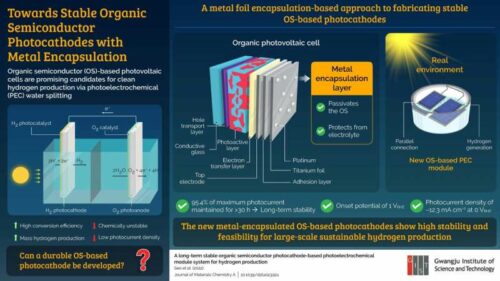A team of researchers has developed a highly stable and efficient photoelectrochemical module using organic semiconductors photocathodes with metal foil encapsulation to enable large-scale production of hydrogen

Hydrogen is the eco-friendly alternative to fossil fuel due to its carbon combustion neutral products (water, electricity, and heat), the conventional method to produce hydrogen is through “photoelectrochemical (PEC) water splitting”. This method is more engaging as 1) mass hydrogen production in limited space without a grid system and 2) high-efficiency conversion of solar energy to hydrogen. However, the photoactive materials used in conventional PECs do not consist of features necessary for a commercial setting. Hence, a team of researchers led by Prof. Sanghan Lee from Gwangju Institute of Science and Technology, Korea, developed a novel method of encapsulating the OS photocathode in platinum-decorated titanium foil, a technique known as “metal foil encapsulation,” to prevent its exposure to the electrolyte solution.
“The metal foil encapsulation is a powerful approach for realizing long-term stable OS-based photocathodes since it helps impede the penetration of electrolytes into the OS, improving their long-term stability as has been demonstrated in our previous studies and other reports on OS-based photoelectrodes,” explains Prof. Sanghan Lee from Gwangju Institute of Science and Technology, Korea
Organic semiconductors (OSs) had emerged as a potential photoelectrode material for commercial PEC hydrogen but they showed poor chemical stability and low photocurrent density. Hence, the team developed an organic photovoltaic cell, in which the OS photocathode was covered with titanium foil and well-dispersed platinum nanoparticles. After experimentation, the OS photocathode showed an onset potential of 1 V versus the reversible hydrogen electrode (RHE) and a photocurrent density of -12.3 mA cm-2 at 0 VRHE. The cell displayed a record operation stability, retaining 95.4% of the maximum photocurrent for over 30 hours without any noticeable deterioration in the OS. Further, the team tested the module under actual sunlight and was able to produce hydrogen.
“With the growing threat of global warming, it is imperative to develop eco-friendly energy sources. The PEC module explored in our study could be installed in hydrogen gas stations, where hydrogen can be both mass-produced and sold at the same time,” says Prof. Lee.
Click here for the Published Research Paper









